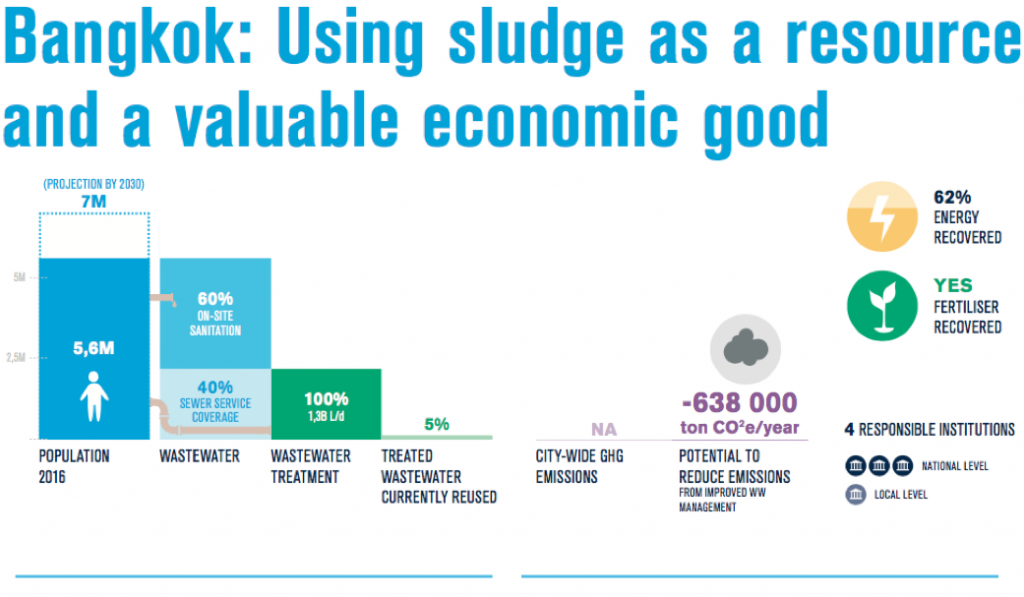Empowering cities to lead the ‘reuse revolution’
New report highlights the wastewater reuse opportunity in eight cities across the globe
A new report, The Reuse Opportunity: Cities seizing the reuse opportunity in circular economy, published today by the International Water Association and OFID (the OPEC Fund for International Development), argues that decisive, urgent and large-scale action is needed to dramatically increase wastewater treatment, reuse and recycling. The report states that cities, as drivers of the global economy, must lead this resource revolution to enable a transition to a circular economy.
Wastewater is a global problem. Today, around 80% of all wastewater is discharged untreated into rivers, lakes and oceans. It creates health and environmental hazards, and contributes to Greenhouse Gas emissions, including nitrous oxide and methane. These emissions are three times larger than those produced by conventional wastewater treatment activities. Recovering water, energy, nutrients and other precious materials embedded in wastewater is an opportunity for cities to transition to the circular economy and contribute to improved water security.
Director-General of OFID Suleiman J Al-Herbish said: “This report illustrates both the global wastewater challenge, and the reuse opportunity in eight cities. These are all cities in low- or middle-income countries where future challenges will be more acute and the need for change is urgent. The report presents city roadmaps and identifies priorities – as well as the benefits – of meeting the Sustainable Development Goal target of halving the proportion of untreated wastewater and substantially increasing recycling and safe reuse by 2030.”
Professor Kala Vairavamoorthy, Executive Director of the IWA said, “The global market for wastewater recycling and reuse reached nearly $12.2 billion in 2016 and is estimated to reach $22.3 billion by 2021. This market expansion is in response to a growing demand from cities and industry for water against a backdrop of increased urbanisation, population growth and climate variability, the result of which is greater water scarcity at a time of increasing global demand. Wastewater management as a resource is a critical solution to these challenges.”
The report focuses on eight cities, all facing different water and wastewater challenges and developing different solutions to address them, and which could be applied in other cities:
Aqaba, Jordan: A mid-size city turning its “zero discharge” challenge into a good opportunity;
Bangkok, Thailand: Using wastewater as a resource and a valuable economic good;
Beijing, China: Building infrastructure to keep up with an ever-expanding mega city;
Chennai, India: Addressing water scarcity through accelerated wastewater reuse;
Durban, South Africa: Treating wastewater as an economic good;
Kampala, Uganda: Protecting its water source with an integrated plan to control, treat and reuse wastewater;
Lima, Peru: Learning by doing under the urgency of shrinking glaciers;
Manila, Philippines: A mega city regenerating resources through wastewater treatment and reuse
Read the report here: www.iwa-network.org/publications/the-reuse-opportunity
– EDITORS NOTES –
Wastewater: The reuse opportunity will be launched at the headquarters of OFID (the OPEC Fund for International Development) in Vienna on 27 February 2018.
About the OPEC Fund for International Development
OFID is an intergovernmental development finance institution established in 1976 by member states of the Organization of the Petroleum Exporting Countries (OPEC) as a collective channel of aid to developing countries. Working in cooperation with country partners and the international donor community, OFID aims to stimulate economic growth and alleviate poverty by providing financing to build basic infrastructure, boost delivery of social services and promote productivity, competitiveness and trade. Realising the vital role clean water plays in fighting poverty, OFID is supporting operations that range from large-scale sanitation and water supply systems to village pumps and school latrines, to schemes rationalising water use in arid regions, and rehabilitating and expanding irrigation systems. Our vision is a world where sustainable development, centered on human capacity building, is a reality for all. Our mission is to foster South-South Partnership with fellow developing countries worldwide to eradicate poverty www.ofid.org
About the International Water Association
The International Water Association is a global knowledge hub for water professionals and anyone concerned about the future of water. It has a 60-year heritage connecting water professionals worldwide to find solutions to the world’s water challenges as part of a broader sustainability agenda. As a non-profit organisation with members in more than 130 countries, the IWA connects scientists to practitioners and communities so that pioneering research delivers sustainable solutions. It further fosters technological innovation and drives best practice through international frameworks and standards. www.iwa-network.org


